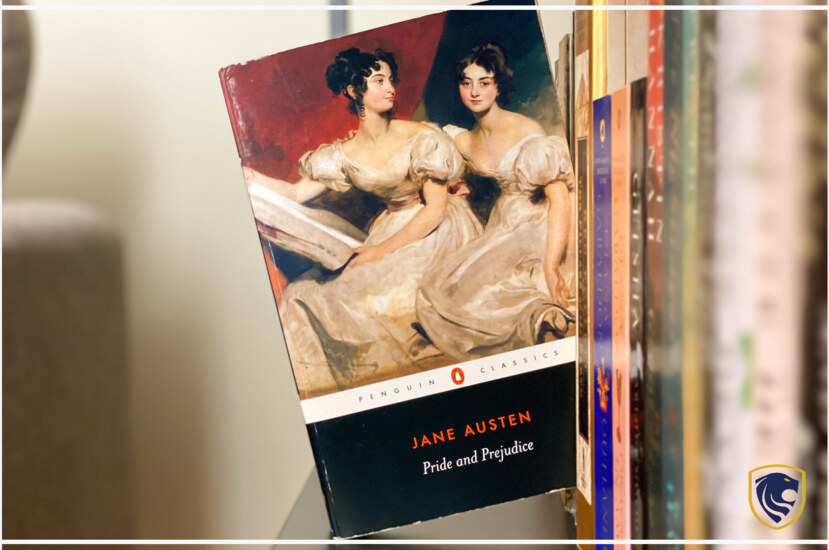Jane Austen’s romantic British novel Pride and Prejudice was anonymously published in 1813. The novel depicts a story in rural England during the period of the Regency era. The story revolves around the protagonists Elizabeth and Darcy along with supporting characters that assist in elaborating the themes of the novel.
The story began with the news that a bachelor called Charles Bingley had left the Netherfield estate. The residents in the neighborhood were thrilled and excited as he was a suitable groom for their daughters. Darcy was a friend of Bingley and he met Elizabeth for the first time in a ballroom that Bingley organized at Netherfield. So, Bingley was very pleased with the gathering and thought all the girls were very pretty. He got entangled with Elizabeth’s sister, Jane who was the most beautiful girl in the ballroom. On the contrary, Darcy didn’t like the crowd and he refused to dance with Elizabeth as he thought she was not beautiful enough to dance with him. But over time Darcy developed an attachment towards Elizabeth because of her intelligence and lively disposition.
Lieutenant George Wickham
George Wickham was a militia officer. It was George Wickham’s father who managed Darcy’s estates. Wickham was good-looking and was popular among the females. Both Darcy and Wickham grew up together. Wickham was to enter clergyhood but later decided to study law. He wasted the money that Darcy gave him to study law. Wickham tried to elope with Darcy’s sister with an eye on her fortune, which was ‘30,000 pounds’ she would inherit. Darcy and Wickham became arch-enemies afterward. Wickham lied to Elizabeth that Darcy deprived him of the clergyman’s revenue that Darcy’s father bestowed on him. Elizabeth believed Wickham’s falsehood and thought Darcy mistreated Wickham of whom she had a good impression.

Pride and Prejudice by Jane Austen
The Departure of Bingley and the entire Netherfield party
Bingley and the entire Netherfield Party left for London unexpectedly to the chagrin of Jane. Elizabeth learned later that Darcy and Bingley’s sister played a part in separating Jane and Bingley.

Pride and Prejudice by Jane Austen
Darcy’s First Proposal
As Elizabeth was under the impression that Darcy was responsible for the separation of Jane and Bingley, her dislike for Darcy was at its height and, ironically Darcy chose this particular time to propose to Elizabeth. Also, she refused his proposal and expressed her disappointment with him for his involvement in the separation of Bingley and Jane and his mistreatment of Wickham. So, the next day Darcy wrote a letter to Elizabeth in which he explained and justified his actions. After thorough contemplation, Elizabeth realized Darcy was innocent of wrongdoing, even though he was reserved and proud.

Pride and Prejudice by Jane Austen
Elizabeth’s visit to Pemberley
Elizabeth visited Darcy’s estate of Pemberley when she went on a trip to Derbyshire country with her aunt and uncle, the Gardiners. They met Mr. Darcy out of the blue. Darcy introduced Elizabeth to her sister, Georgina. He treated Elizabeth in a courteous, kind, and pleasant manner. He invited her to Pemberley for dinner.
While in Pemberley, Elizabeth received the news that Lydia had eloped with Wickham. They got alarmed and left immediately. Mr.Gardiner strived hard to find them. Darcy managed to arrange their marriage, but Elizabeth was oblivious to it. Later the Gardiners divulged to Elizabeth that it was Darcy who was instrumental in arranging their marriage.

Pride and Prejudice by Jane Austen
Eventually, Bingley returned to Netherfield and proposed to Jane. Lady Catherine was the aunt of Darcy who was an arrogant lady. Lady Catherine De Bourgh happened to hear a rumor that Darcy hoped to marry Elizabeth. So, she visited Elizabeth to get the promise not to marry Darcy citing the imprudence of marrying two people who belonged to two different statuses. Elizabeth refused her demands. Lady Catherine related the incident to Mr. Darcy in anger. When Darcy learns about Elizabeth’s refusal to agree to Lady Catherine’s demands, Darcy realizes that there is a possibility of Elizabeth changing her mind to marry him. He proposed to Elizabeth for the second time and she accepted it.
The British Society depicted in the novel
It is said that Jane Austen wrote about her own experiences of British society in the Regency era. The characters in ‘Pride and Prejudice’ belonged to the upper and the middle classes. Darcy was from a land-owning aristocratic family. Elizabeth was from the gentry class and belonged to the nobility. However, her family was at the lower end of the social hierarchy and did not have riches. Industrialization took place from 1760 to 1840. A new middle class emerged during this period. They got their social standards by acquiring money by engaging in trade. Bingley belonged to this newly emerged middle class. Being born into aristocracy and inheriting wealth by birth was considered highly respectable. Acquiring money by trade was a less respectable means of fortune. So, Darcy was the richest of all and he stood at the highest place of the social hierarchy during this period of British society.

Pride and Prejudice by Jane Austen
Jane Austen exposed the qualities of people belonging to the upper echelon, their value system, and their aspirations in British society at the time. The novel exposed many unwritten laws and social conventions that prevailed in the Regency era.
Regency Era
The Regency Era is a subperiod of the Georgian Era. The Regency Era was nine years from 1811 to 1820. George IV was appointed the proxy ruler as his father King George III was deemed unsuitable to rule. During these nine years of the Regency period the aristocracy bloomed.

Pride and Prejudice by Jane Austen
Social Etiquettes
During the Regency era, British society regarded women’s reputations as of paramount importance. Their lifestyles were dictated by the norms in society. The women were supposed to behave in certain ways.
The girls were to be accompanied by a chaperone or be accompanied by a relative or a respectable married person when they traveled. Once Jane was invited for a stay at Netherfield. Jane fell ill while she was at Netherfield. Worried Elizabeth walked to Netherfield to see her sister without a chaperone. She arrived with muddy skirts and everybody at Netherfield disapproved of it. She was criticized as she did not adhere to social decorum.

Pride and Prejudice by Jane Austen
The importance of individuals was measured by the behavior of family members. People were expected to behave in a refined way. A family that was deemed good needed to share certain characteristics and behave according to the norms of British society. Mrs. Bennet was ill-mannered. She laughed and talked so loudly. It resulted in spreading a bad reputation of the Bennet family. The mother’s absurd behavior made Elizabeth feel ashamed. When Darcy proposed to Elizabeth, he said that it was a favor he was doing as she had embarrassing family connections.
Lydia’s elopement with Wickham put the reputation and the social standing of the Bennet girls at stake. A girl living with a man out of wedlock wasn’t accepted in British society. So, their marriage saved the reputation of the whole family and the marriageability of the Bennet girls.
Gender Roles
In British society, gender roles were quite rigid. The girls of the middle class and upper class enjoyed the freedom to get an education, but it was limited to being ‘accomplished’. It included learning to play piano, reading, decorum, and norms in society. Often women got an education by hiring private tutors, governesses, and private schools. Women didn’t engage in a profession.

Pride and Prejudice by Jane Austen
Dependence of Women
Some of the social realities in British society were reflected in the novel. In the Regency Era, marriage was the only means of financial and social stability for women. So, if women aspired the upward mobility in society, marriage was the only means. Mrs. Bennet’s main objective was to marry off her daughters. Even though she was ridiculed, the system in British society made her so desperate. She was worried about the economic vulnerability of the Bennet girls. So, to achieve economic stability and autonomy, they had to be married to the well-off.
If a woman was unmarried she would have to depend on a relative who would come forward to help them with a handout. Women didn’t have an entail for property in the Regency Era. Mr. and Mrs. Bennet had five daughters, but they didn’t have sons. So, it was the Bennet girls’ cousin, William Collins who would inherit Mr. Bennet’s property after his demise. Collins was a clergyman. He visited the Bennets with the hope of selecting one of the Bennet girls for marriage. He was portrayed as stupid and was a caricature in the novel. His choice was Elizabeth and he was stunned and offended when Elizabeth turned down his proposal.

Pride and Prejudice by Jane Austen
Then he proposed to Elizabeth’s best friend, Charlotte Lucas, who was an intelligent girl. She was 27 years old and was passing marriageable age as per the standards of the Regency Era. Charlotte married him despite Collins was not a suitable guy, for economic stability. Charlotte acted as a prototype of a typical woman in the Regency Era.
In conclusion, Jane Austen’s ‘Pride and Prejudice’ is popular to date. Its readership can get a vivid picture of British society in the Regency era.




